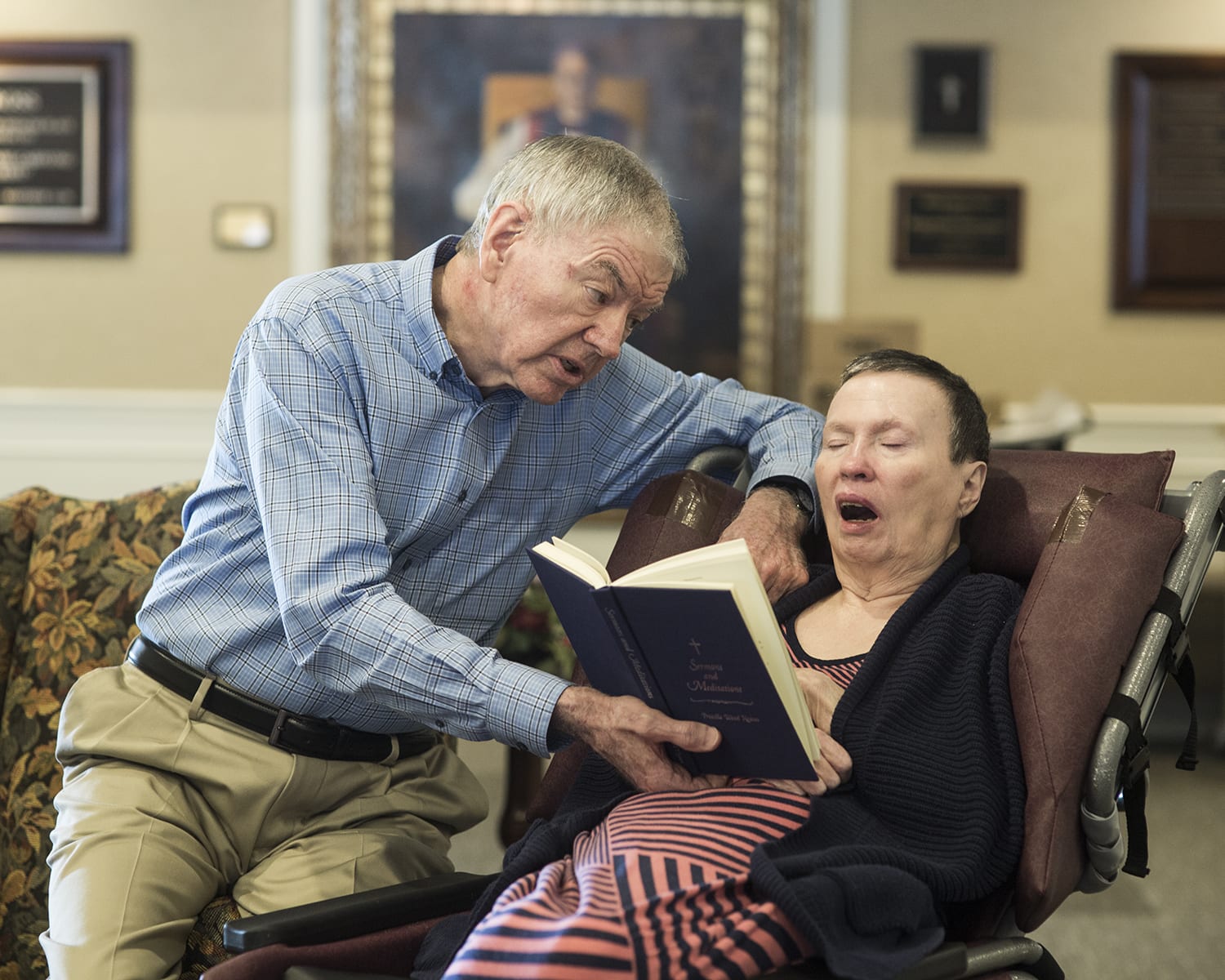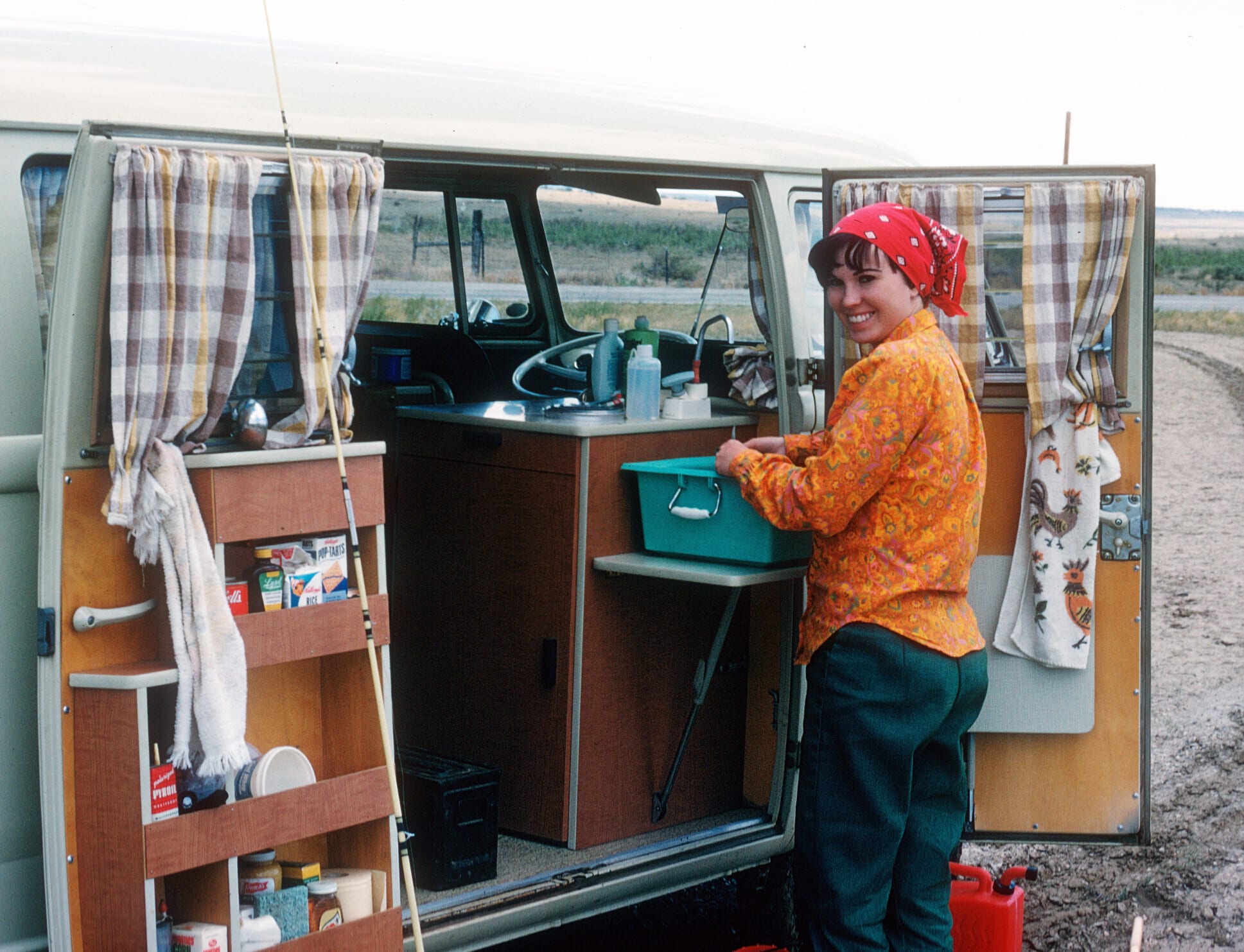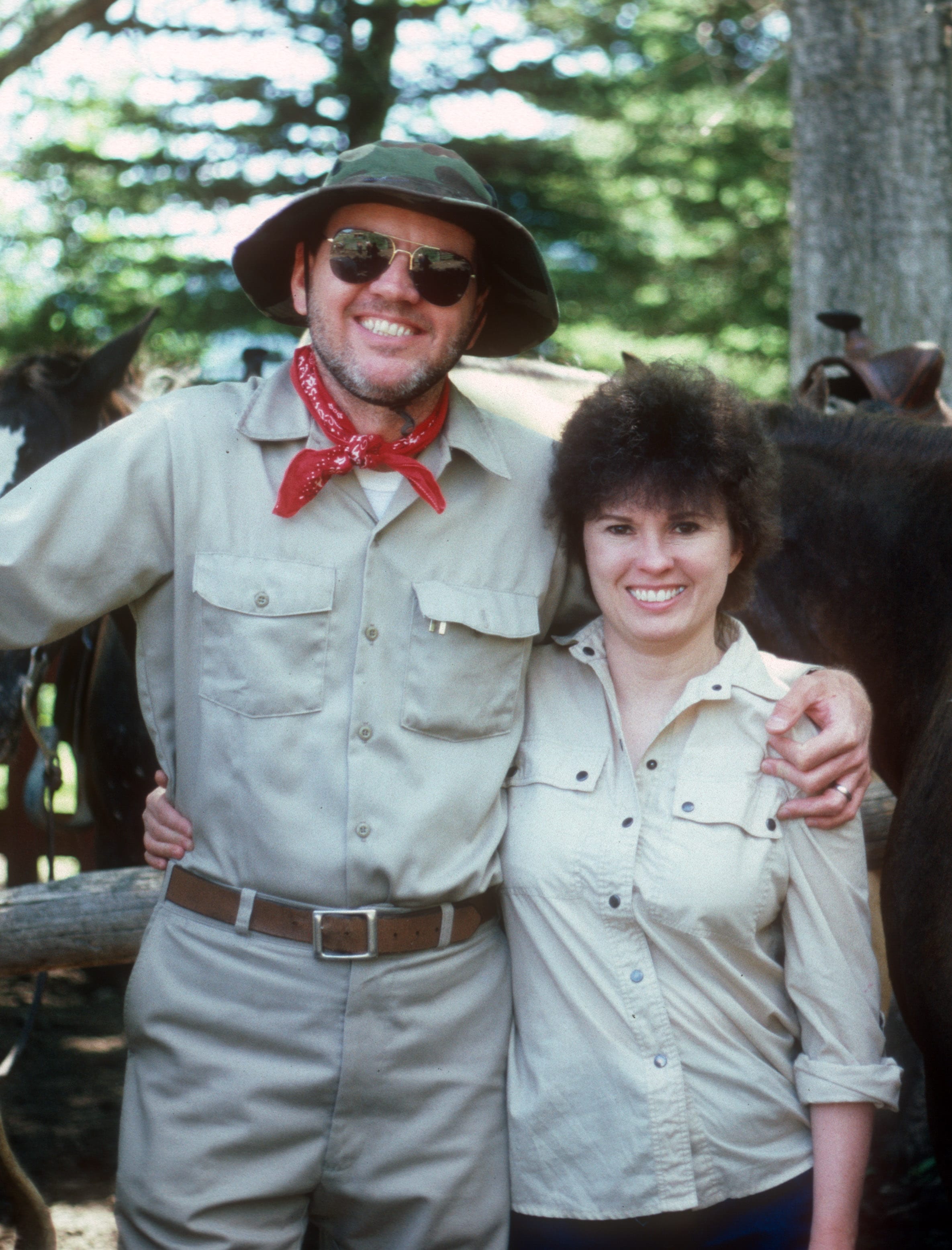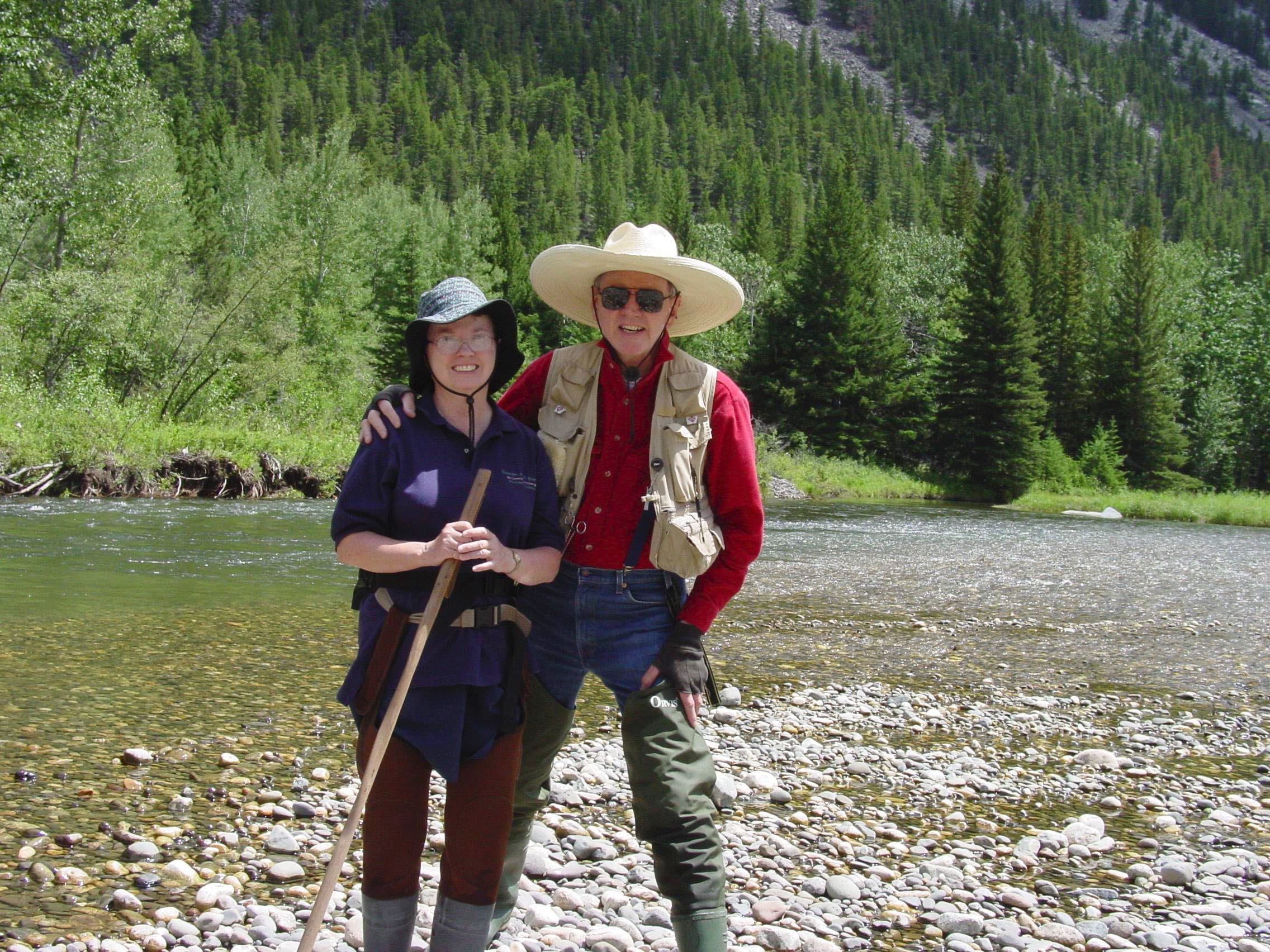Faith And Love Unfortunate Irony Turns Renowned Scientist Into Caregiver For His Minister Wife
 Bill Neaves and his wife, Priscilla, look at the compilation of Priscilla's writings and sermons that Bill put together when she was in the early stages of a brain disorder that affects cognitive function and movement. (Brad Austin | Flatland)
Bill Neaves and his wife, Priscilla, look at the compilation of Priscilla's writings and sermons that Bill put together when she was in the early stages of a brain disorder that affects cognitive function and movement. (Brad Austin | Flatland)
Published January 1st, 2018 at 6:00 AM
Churchgoers at a tidy, white-steepled United Methodist Church in Carrollton, Missouri, heard a frank admission from their guest pastor one spring morning in 2007.
“When asked to preach this Sunday, I almost said no,” Priscilla Wood Neaves told the congregation. “Why? Not because I lacked training and experience, and I have always enjoyed preaching.”
She had, in fact, fought for the right to preach. As a girl growing up in the 1950s in the Texas panhandle, Neaves was told that women could not be ordained ministers in the United Methodist Church. The information was erroneous, but not until she left Texas for college, marriage and motherhood did she encounter a female pastor who could disprove it.
Eventually Neaves graduated from the Perkins School of Theology at Southern Methodist University, became an ordained Methodist minister and hospital chaplain, and gathered a wealth of life experiences to frame her sermons.
And then life dealt a blow that temporarily stilled her voice.
“I was diagnosed with Parkinson’s disease three years ago,” Neaves told the congregation in Carrollton, “and I have not formally ‘proclaimed the Word’ since then. I guess it was because of feeling a mixture of fear and anger directed toward God.”
Listening in the congregation to the candid and unusual sermon was the preacher’s husband, Bill Neaves. Never entirely comfortable with church and organized religion, he kept a low profile. Few in the country church knew that, while Priscilla was wrestling with her medical diagnosis, Bill was engaged in a professional and political struggle involving the search for cures for diseases like Parkinson’s.
Childhood sweethearts from Spur, Texas, Bill and Priscilla Neaves both packed up briefcases stuffed with credentials when they moved to Kansas City in 2000.
He had been dean and executive vice president for academic affairs at the University of Texas Southwestern Medical Center in Dallas, a lauded institution where Nobel Prize winners worked with other faculty members to advance science and medicine. She was a chaplain at Children’s Medical Center Dallas — a front-line responder to small patients and their families in moments of fear, relief and overwhelming grief.
James Stowers, founder and CEO of American Century Investments, had consulted with Bill Neaves about a research facility he was creating in Kansas City. He envisioned a place in his hometown where premier scientists would have resources and time to study the causes of diseases and embark on a search for cures. Stowers asked Neaves to be the first president and CEO of the Stowers Institute for Medical Research.
“I was enthusiastic about it,” Neaves says. “Few people want to support basic science.”
But he needed to persuade Priscilla. She had balked at several other moves when opportunities had arisen. After a dinner with Stowers; his wife, Virginia; and other family members, she agreed. Neither Bill nor Priscilla Neaves had any way of knowing that during the next few years his new job would come to involve politics as much as science, and her physical and spiritual health would be put to the test.
Priscilla quickly dived into life in Kansas City by joining the board of directors of the medical ethics research and advocacy group now known as The Center for Practical Bioethics. She also joined the Institutional Review Board for Children’s Mercy Hospital.
The first signs of trouble appeared in the fall of 2003. Priscilla didn’t feel well; something was off, she said. She wasn’t able to walk with her normal stride. When the odd symptoms persisted for a few weeks, Bill tapped his medical contacts.
In January 2004, a physician at the University of Kansas Hospital diagnosed Parkinson’s disease. Another physician at Washington University Medical Center in St. Louis concurred.
As Priscilla noted in her sermon a few years later, the news came as a blow. Parkinson’s disease is a neurodegenerative disorder that hinders the brain’s ability to produce dopamine, the transmitter that enables people to regulate motor functions.
Still, the disorder progresses slowly in most people, and Priscilla was accustomed to a busy and productive life. She became a full-time volunteer chaplain at Carroll County Memorial Hospital in 2006 after the couple purchased a farm about 60 miles northeast of Kansas City. In that capacity, she provided spiritual resources and facilitated support groups for cancer and Parkinson’s patients.
Though his wife’s health was a concern, Bill Neaves was ebullient about progress at the Stowers Institute in its early years. First-rate scientists had indeed been willing to come to Kansas City, and they were engaged in rigorous and productive research.
One cloud on the horizon was legislation that kept resurfacing in the Missouri General Assembly. Pushed by Matt Bartle, a lawyer and at the time a state senator from Lee’s Summit, its stated purpose was to ban human cloning. But Bartle’s definition of cloning went far beyond a scenario in which a squawking baby might emerge from a laboratory. His bill aimed to ban even the copying of human embryos as small as a few dozen cells.
Those miniscule lab dish embryos are home to embryonic stem cells that can be formed with a patient’s DNA. Scientists believe the newly created cells can be used to repair tissue, organs and nerves damaged by all manner of injuries and diseases. In the early 2000s, they eyed the laboratory procedure with great hope.
To Bartle and others, it represented a moral threat. That’s because, once embryonic stem cells are harvested, the tiny embryo that sheltered them is destroyed. What some people viewed as a somewhat mysterious lab dish procedure, religious conservatives saw as the willful termination of human life.
The issue made it to the November 2006 ballot in the form of a constitutional amendment that would protect all scientific research in Missouri that was legal under federal law.
Jim and Virginia Stowers spent $30 million to bankroll the campaign supporting the amendment. Opponents formed their own coalition and also raised millions of dollars. Missouri citizens were besieged by television ads alternately lauding the promise of stem cell research and issuing dire, if misleading, warnings about cloning.
Bill Neaves was in the thick of it all. He wrote essays and traveled the state, speaking to groups to explain what embryonic stem cell research meant for science and the Stowers Institute. He touted its potential to stop or slow the suffering from devastating diseases. He mentioned Parkinson’s disease. What he never said publicly was that the person closest to him had been diagnosed with that illness.
The constitutional amendment passed by a razor-thin margin — a difference of 50,800 votes out of 2.1 million cast.
Ultimately, science itself stepped in to bring an uneasy truce. A Japanese researcher found a way to make adult cells behave like embryonic cells, with the same capacity to repair and rebuild damaged body parts. The reprogramming method is less costly than the somatic cell nuclear transfer procedure, and it sidesteps the ethical issues. It is now the preferred avenue for many scientists, including those at the Stowers Institute.
With his wife at his side, Bill Neaves had done his part to stand up for science. But science could not immediately return the favor. It could not stop the frightening changes that were going on in Priscilla’s body.
“For more than a quarter-century, I have retreated each summer to the Beartooth Wilderness on the Boulder River in Montana,” Priscilla Neaves wrote in July 2008. “I relax, enjoy, meditate and relate to God’s magnificent mountains and forests. Perhaps my Native American heritage encourages me to celebrate nature — my paternal grandmother was half Choctaw.”
From the deck of the wilderness home she and Bill cherished, Priscilla wrote of her love of nature, as experienced in Montana, West Texas and New England — all places she had lived. Bill would later include the meditation in a compilation of his wife’s sermons and writings. Soon after that, Priscilla’s illness made further trips impossible. “Mercifully,” Bill wrote in the afterword of the book he compiled in his wife’s honor, “we rarely realize that we are doing a beloved thing for the last time.”
The previous couple of years had been difficult. The couple lost their son, William Jr., in May of 2007. Living in Houston, he had waged a long struggle with alcoholism and died of its complications. “Priscilla was amazingly stoic about it, but I know it must have been incredibly difficult for her,” Bill says now.
She continued her work as a voluntary chaplain and frequently preached sermons in the chapel of Carroll County Memorial Hospital.
“When questions about the meaning and purpose of life hit us like a tornado, God’s grace can be most tangible,” she told her small congregation in 2009. “Job’s way can also be ours. I know. I have been there.”
By this time the Stowers Institute was thriving. Jim and Virginia Stowers had given $2 billion worth of American Century stock to its endowment. Labs were filling up with impressively credentialed scientists. A spinoff biotechnology company, BioMed Valley Technologies Inc., had been formed to move treatments and therapies into clinical development.
In June 2010, Bill Neaves announced he would retire as president and CEO of the institute. He had already begun handing off the day-to-day operations to a protege, David M. Chao.
Neaves talked about wanting more time for research and various projects. He was especially excited about returning to research he’d begun 40 years ago, studying the asexual reproduction patterns of some species of lizards. He didn’t disclose publicly that his family was dealing with an all-consuming illness.
Priscilla’s symptoms were increasingly resembling more of a dementia-type illness than traditional Parkinson’s disease. At the end of 2011, specialists at the Mayo Clinic in Rochester, Minnesota, found that Priscilla was suffering from cortical lewy body disease — a brain disorder closely related to Parkinson’s but even more devastating. The destruction proceeds beyond motor control to destroy brain neurons associated with cognitive functioning and movement.
Bill Neaves recalls that his wife absorbed the terrible news calmly. “Priscilla was still pretty much intellectually intact then, and I was very impressed with what she said,” he recalls. “The neurologist said, ‘This is what we have, and it will probably be fatal within a year and a half.’ Priscilla said, ‘Well, glad to know what I’m facing, and I know firsthand that a lot worse things have happened to people than what is happening to me.’”
The couple had moved several months earlier into an apartment in Bishop Spencer Place, a retirement facility in midtown Kansas City that has provisions for nursing care. Linda Yeager, who was chaplain there at the time, remembers that Priscilla sought her out.
“She was very anxious for me to know that she was a minister herself, and she was very interested in helping other people,” Yeager said. “She wanted to share her books, and she wanted to do research and help people. She was greatly respected and loved.”
But Priscilla’s disease was progressing rapidly. By 2012, she was experiencing anxiety, confusion and paranoia. Daily tasks such as routine teeth brushing became a struggle.
On the advice of her family physician, Priscilla moved to a Leawood facility that treats patients with dementia. She became bedridden, mostly paralyzed from the chest down, with limited use of her hands. Once a passionate voice on nearly every topic, she now spoke only intermittently.
For nearly a year, Priscilla was officially in hospice care.
Bill, who describes himself as “a compulsive-type person,” began preparing for his wife’s death. He made cremation arrangements. He visited a printer and prepared a death announcement for Priscilla. Then he focused on putting together her book, “Sermons and Meditations,” which offers an eloquent, widely sourced study of theology from the perspective of a feminist and an environmentalist.
“That was a very therapeutic thing for me,” Bill says of the book project.
And then the mysterious, maddening, wonderful creation that is the human body served up another surprise. At the end of 2013, Priscilla’s disease stopped progressing. It had run its course, a specialist told Bill. With good care, she could live for a long time. But the damage already done — the paralysis, the speech loss, the loss of memory and cognition — was likely irreversible.
These days, Bill awakens most mornings at 5 a.m. in the apartment he and Priscilla share at Bishop Spencer Place. He sets about slicing up fruits for Priscilla to eat at lunch and supper. About an hour later he escorts his wife to the skilled nursing portion of the complex and sees that she is settled at her usual breakfast table. He makes sure she drinks water.
Bill, 74, and a year older than his wife, then drives to the Stowers Institute, arriving around 6:30 a.m. A tall, rail-thin figure in blue jeans, he glides around its hallways at a clip that feels like a trot if you’re trying to keep up with him. He knows everyone by name, from top scientists to the servers in the cafe. He teaches a research course and writes papers, mostly for scientific publications. He also serves on the boards of several institutions.
Sometimes he visits the institute’s reptile facility, where he and a Stowers scientist, Peter Baumann, continue the study of unisexual lizard reproduction.
A couple of years ago, the scientific journal “Breviora” honored Neaves by lending his name to a new lizard species, aspidoscelis neavesi — Neaves’ whiptail lizard. And very recently, the “Bulletin of the Museum of Comparative Zoology,” out of Harvard University, named a different species aspidoscelis priscillae — Priscilla’s whiptail lizard. This is only appropriate. When they were much younger, Priscilla spent months collecting lizards with Bill in the deserts of New Mexico.
Bill Neaves returns to Bishop Spencer Place around 10:30 a.m. and stops in the cafe to buy Priscilla a cup of coffee. He helps her eat lunch and, again, makes sure she drinks water. Then it’s back to the Stowers Institute until about 3:30 p.m. Late afternoons and evenings are consumed by a routine of coffee, dinner, companionship and bedtime preparations.
It’s an “incredibly ritualized schedule,” Bill acknowledges. “But I read somewhere a few years ago that one of the practical bits of advice for people who are into Zen is to turn what might otherwise be routine activity into real rituals. That seems to work for Priscilla and me.”
If life had served up a different set of circumstances, Bill Neaves might be traveling the world right now, speaking at scientific conferences and soaking in the tributes due the founding president of a world-class research facility.
“I’m really glad I don’t have to do that anymore,” he tells me.
“Not that I wouldn’t rather be sitting on our deck looking over the trees at the Beartooth Wilderness in Montana with Priscilla, enjoying a glass of chardonnay, but this isn’t … isn’t bad,” Neaves says. “It’s better than I thought it would be. There’s still enough of Priscilla there to make it feel very rewarding to have the time with her.”
And what about Priscilla, the woman who broke barriers in her church, raised two children, comforted grieving families and lived with Bill in places as far-flung as Boston and Kenya?
For all of her life, she had been a reader, a writer and a thinker. As a hospital chaplain, she kept copious notes about her encounters with patients and their families.
“I was impressed by this woman’s strength,” Priscilla wrote, after an encounter with a single mother. “She did not act like a victim, although she has been victimized and suffered many hard times. She did the best she could, and that was pretty amazing.”
Now the ravages of a terrible disease have left Priscilla unable to write down her thoughts, or verbalize them. But remarks in the sermons that her husband compiled seem prescient.
“Cherish the time you have with those you love,” she counseled a group in the Carroll County Hospital Chapel. “Don’t wait for tomorrow. Don’t let the deadlines and demands of daily life delay the dreams you share.”
And this: “As we all move closer to a grave, the fleeting time we are given with each other is so precious when measured against the time of eternity. How are we using that time?”
—Barbara Shelly is a veteran journalist and writer based in Kansas City





